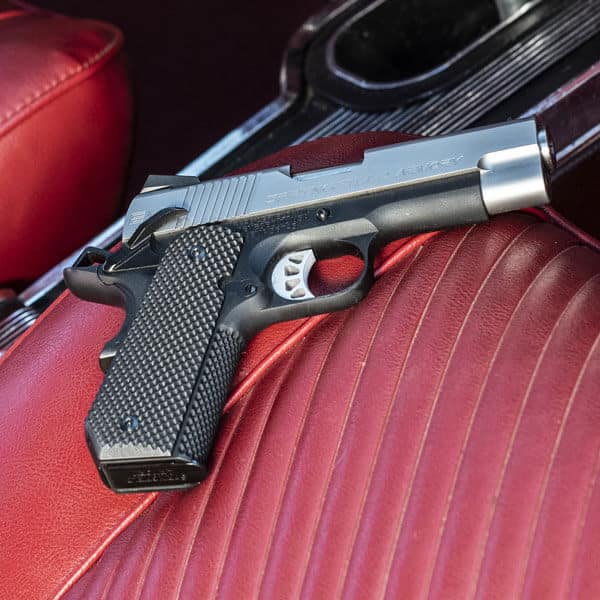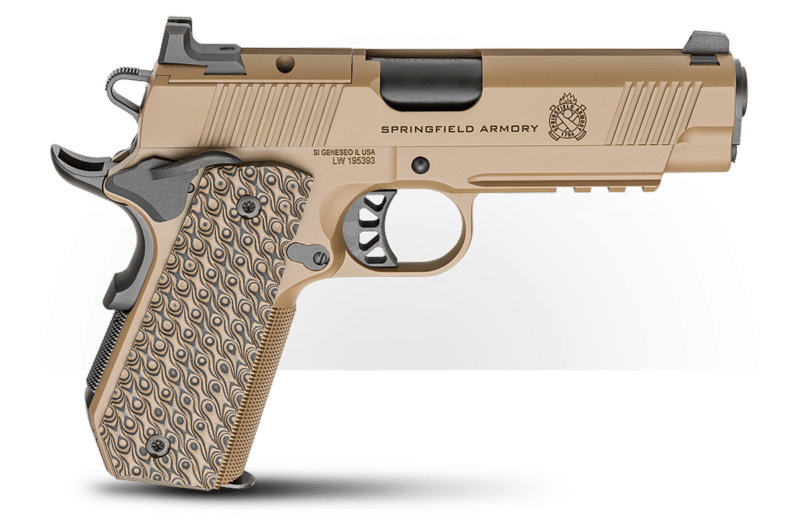Personal Defense: Being Street Smart
June 16th, 2019
5 minute read
Many of the same skills that cops rely on to keep them and society safe from those who would do us harm are just as applicable to the rest of our citizenry—particularly those who carry a gun. For as long as I can remember, I’ve always had an interest in law enforcement. In my early 20s, I began to seriously consider becoming a police officer. My dad, an electrical foreman at the nearby power plant, did his best to dissuade me. I remember him saying, “Why would you want to deal with the scum of the earth every day?”
It’s a fair question. As a police officer you do tend to deal with the same people, or at least the same type of people, day after day. They’re called criminals, and interacting with them on a regular basis gives you a keen insight into their behavior.
Taking Command
When you’re around liars, thieves and predators long enough, you learn to spot certain “tells” that could indicate trouble is afoot. Over time, you learn not only what to look for but also how to position yourself so that when something bad happens, you’ve given yourself every advantage.
A good street cop has certain attributes: an aura referred to in the law enforcement arena as “command presence,” keen observation skills, effective verbal communication, sound tactics and, above all, the will to win.
Command presence is hard to define but easy to recognize, especially to a criminal. It’s an air of assuredness, competence and professionalism. Command presence has little to do with size or gender and everything to do with an officer’s perceived willingness and capability to do the job. You can’t fake command presence—not even with a tough guy scowl or bulging biceps—because it is a byproduct of the hard work that went into developing the quiet confidence that lets others know you’re a force to be reckoned with.
Command presence isn’t achieved by putting on a uniform, so everyday citizens can develop this attribute. Awareness of your surroundings, confidence in your training and a willingness to do whatever it takes to protect yourself and your loved ones will make you an undesirable target for criminals, even if they can’t quite put their finger on why.
Masters of Observation
Cops are masters of observation. They’re on the lookout for anything out of the ordinary, like noticing that the person who just walked into the restaurant on a cool day is sweating profusely, is glancing over his shoulder, appears fidgety and has a hand tucked under his shirt near the front waistband of his pants (a favorite hiding spot for concealed weapons).
Forget all the BS you’ve heard about looking in someone’s eyes to gauge intent. Cops know that hands kill. Always watch the hands. If someone’s hand is in his pocket, hidden behind his leg or tucked under his shirt, be wary because they could be clutching a weapon. If you can’t see that both hands of a potential adversary are empty, the hairs on the back of your neck should be standing tall.
Sure, there could be a reasonable explanation for the subject’s unusual behavior, but he also could be high on drugs and looking around to make sure the coast is clear and preparing to draw a pistol from his waistband to commit an armed robbery. In any event, observing this subject’s behavior enables you to start developing a plan long before the robber is pointing his gun and yelling demands.
Police officers are sometimes targeted for no other reason than they wear a badge and are the most recognizable representatives of the government so they learn quickly to give themselves every advantage, including spotting a criminal before the criminal spots them. I doubt you’ve ever seen a uniformed police officer inside a restaurant with his back to the main door unless a fellow officer is sitting across from him.
Cops are also aware of exits. The benefits to this are twofold. For starters, knowing where the exits are located can help an officer predict the direction a fleeing criminal might run. Second, it’s critically important in the event of an emergency when panic-stricken occupants all try to squeeze out the same door they entered from. One of the first things you should note upon entering any room is the number of exits and where they are.
Communication is Key
Despite Hollywood’s portrayal of cops as cowboys constantly chasing or fighting bad guys, the vast majority of real-life police contacts are far less dramatic. In fact, only a small percentage of them involve any degree of force. Most often, it’s a cop’s verbal skills that help resolve or at least mitigate some sort of dispute. As such, veteran cops are usually verbally persuasive. Even when faced with an arrest situation, voluntary compliance is the goal.
Oftentimes, a nonchalant or even reassuring tone yields compliance. Slow-playing it, even when you know the suspect is wanted for a violent felony, is typically a good starting point. Of course, cops know all too well that being “Officer Friendly” doesn’t always work.
While the officer appears outwardly calm, he is anticipating resistance and totally prepared to respond with reasonable force. Cops know that when dealing with a combative suspect and telling him “Sir, please get on the ground” is probably wasting breath that would be better spent oxygenating their body to establish physical control of the suspect.
Communication skills are equally as important to those not in law enforcement. It’s great if you can defuse a situation verbally without having to respond physically. Depending on the situation, this may involve apologizing, as in the case where you accidentally bump shoulders with someone walking past you.
But even as you’re saying “Excuse me” or “I’m sorry,” your open hands are held up between you and a potential attacker. He will likely view your hand placement as a sign of submission. What he doesn’t know is that your hands are strategically placed to strike or fend, as appropriate.
Other situations will call for a more assertive verbal response. For instance, if someone you don’t know suddenly changes course and makes a beeline for you in the deserted parking lot, clear and concise verbal commands such as “Stay back!” or “Don’t come any closer!” send a clear message that you mean business and you are ready and willing to defend yourself.
When communication fails, cops rely on sound tactics to see them through. There’s really nothing mysterious about using sound tactics. More often than not, it’s about understanding the situation you’re up against and incorporating a commonsense approach to achieve the desired result. As disappointing as it may seem, there really aren’t any super-secret ninja/high-speed operator techniques that, once learned, can be employed at the first sign of danger to ensure your safety.
Behind the Wheel
One common-sense tactic used by cops that’s 100 percent transferable to everyone pertains to driving. Before obtaining a driver’s license, you’re taught about stopping distances and the importance of leaving a cushion between your vehicle and the vehicle in front of you. This is a good practice not only from a defensive-driving standpoint but also from a self-defense perspective. When I was a rookie cop, my field-training officer stressed to me the importance of leaving a gap between our patrol vehicle and the vehicle in front of us when we were stopped. If we were ambushed—or, far more likely, dispatched to an emergency call or witnessed a crime in progress—leaving a gap would enable us to maneuver through traffic.
The same logic applies to all drivers. If you allow your vehicle to creep too close to the vehicle in front of you, you’re essentially boxed in and unable to escape in your vehicle in the event of an emergency. A good practice is to stay far enough back to see where the tires on the vehicle in front of you meet the road.
The Will to Win
As important as tactics are, they pale in comparison to the single most important attribute a police officer must possesses: an unwavering will to win the encounter.
Unfortunately, in many cases, cops aren’t as highly trained as the general public may assume. For instance, it’s not uncommon for an avid recreational shooter to be more proficient than a police officer. But the big difference between the minimally trained police officer and recreational shooter—the cop’s one saving grace—is the cop is used to being in dangerous situations and is willing to go into harm’s way.
Cops would love to be there in your moment of need, but that’s not always possible. “When seconds count, police are minutes away,” as they say. That means you need to be not only physically prepared to handle a defensive situation—through firearms and other self-defense training and regular practice—but also mentally prepared and willing to defend yourself and your loved ones.
Originally appeared in Handguns Magazine.
Join the Discussion
Continue Reading
Did you enjoy this article?

 67
67






